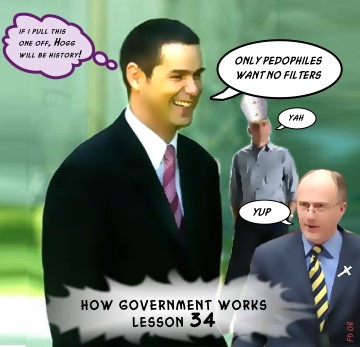No improvement to be seen, no word on when Conroy’s useless net censorship trials are to commence – and ratbag Christian fundamentalist wowsers are still prancing their absurdities, flopping their limp wobbly bits for all to see.
Refresh yourself with current ultra-conservative blither and far more intelligent anti-filter rejoinders:
Summary: Mark Newton Vs Jim Wallace on ABC Radio National net censorship debate
Unfortunately, Mr Wallace either doesn’t understand what ‘prohibited content‘ consists of or he has outright lied on air as the ACL’s pro filter website states ‘Despite fear-mongering about censorship, adults will be able to opt in to view some forms of legal porn.’ Just some forms of legal porn Jim?
Life Matters Mandatory Internet Filtering Transcript
Syd Walker comments on the Life Matters program followup forum
Stilgherrian at Crikey writes Who supports compulsory Internet filtering, exactly?
The Christian Right continues to be Conroy’s main supporter. Only last weekend the Fairfax news sites carried the Australian Christian Lobby’s Jim Wallace’s argument for compulsory filtering, which I have deconstructed elsewhere.
Curiously, Wallace uses exactly the same two examples of over-the-top p-rnography, r-pe and b-stiality, that Hamilton used in his polemic for the ABC News website in November. Who’s coordinating whose talking points here?
Stilgherrian again – Jim Wallace’s pro-censorship lies and distortions
Since Wallace promotes himself as a representative of good Christian values, I’ll allow that he may just be ignorant rather than a deliberate liar. Ignorance is no sin: it can be cured with knowledge. But he does use the familiar fraudulent propaganda techniques: misrepresenting his opponents; cherry-picking numbers; failing to explore the implications of those numbers; citing the same suspect Australia Institute report; and wrapping it up in the same old “protect the children” cant.
Websinthe contributes a Response to Jim Wallace’s puddle of misinformation
Time and time again, the assertion that ‘this system is not going to stop any adult from viewing anything that is legal’ has been debunked by close analysis of the relevant legislation. The ACMA black-list bans content that, while illegal to broadcast, is perfectly legal for an adult to view. For instance, where the ACMA receives a complaint about foreign internet content. The content isn’t even forwarded to the classification board; if the ACMA ‘thinks’ it might be prohibited, it is classified as ‘potentially prohibited’ and thrown on the ACMA black-list. It is not illegal until it has been classified as such. Only Australian hosted content is forwarded to the classification board.
A clear example of this occurred only a few days ago. An anti-abortion web site was added to the ACMA black-list despite two things. Firstly, there was no pornographic or child exploitation material on the website, and secondly, the DBCDE had previously claimed that political content would not be blocked.
In The Contents of the ACMA blacklist, Websinthe further reveals the nature of the beast:
The Contents of the ACMA blacklist …are not publicly available. You can, however, determine if a site is ON the list.
Vendors of PC based filters that were offered by the Government can be used to determine whether a site is on the ACMA blacklist by the message given when the site is blocked.
I post this mainly to defer questions about whether or not I have a copy of the ACMA blacklist. I don’t, it is not publicly available. The only way I have been able to tell that the above is possible is because I use Integard on my own PC and it blocked a google result whilst searching for the origins of a meme mentioned on Twitter.
Anyone familiar with Memes knows the particular wiki site to which I refer, but I refuse to link it here as I fear it may be illegal to do so despite the site’s frequent mentioning on perfectly legal websites.
When an ACMA blacklisted site is blocked by a Net Alert filter there is no option for a system administrator to unblock the site and the user is informed that the site is permanently blocked.
Given the nature of this site, it is confirmation that the ACMA does not just filter the illicit parts of sites, but the entire site.
Over at Public Polity, Websinthe strikes again with How legal content will be blocked by the ISP filter
In simpler terms, anything that, if it were a print publication, would be classified as RC, X18+, R18+ or MA15+ will be added to the list of prohibited content if it were hosted outside Australia. There are two interesting provisos here as well.
The MA15+ content would only be blocked if it were a video that wasn’t hosted on a news site. Regardless of who’s hosting it, it is prohibited if transmitted for money over a mobile phone network.
Either way, MA15+ and R18+ content is far from illegal in Australia. Just go down to Blockbuster and hire Interview with a Vampire. Even X18+ print publications are legal in some parts of the country.
Currently it is illegal to host anything in the 4 categories above in Australia. Doing so results in a take down notice.
So when Conroy says “the Australian Government has no plans to stop adults from viewing material that is currently legal”, it is entirely deceptive.
No Character Comic (which is ALSO Websinthe), takes the piss out of Conroy superbly
Syd Walker presents Australia’s Holy Man likes a Good War
In satisfyingly satirical pictorial and literary fashion, machinegunkeyboard says
If you think Australians are serious about their beer, as Razer notes, they’re downright bolshie about their porn. Senator Conroy wants to make the internet conform to Australia’s film and literature censorship laws. In the extraordinarily unlikely event that Labor’s mandatory filtering scam is successful, not only will they bolster the business of ‘restricted premises’ to a degree they’ve never before known (does Conroy or other Labor pol own an interest in any porn shops, I wonder?), but will also very likely create a mountainous public backlash that will see both Labor voted out of government after only one term and the dissolution of the OFLC.
Aside from the unproven claims of a few anti-porn extremists, there’s no psychological evidence that use (or creation) of nonviolent pornography by adults as part of a healthy sex life is in any way harmful to anyone. However, as is usually the case with any manner of prohibition, bans force it all ‘underground.’ Everything from pinup cheesecake to violent rape fantasy porn is far away from public scrutiny, thusly making all porn much more available, inclusive of violent and exploitative sorts.
Won’t somebody think of Helen’s sex life?
Have I missed any other recent worthy contributions to the struggle to maintain decent, liberal Australian internet standards? Please let me know.
 Congratulations to the AFP who have busted another clutch of child proners. The ring used
Congratulations to the AFP who have busted another clutch of child proners. The ring used  The Oz government is offering to receive online policy suggestions which contribute to their Future Directions paper to be released early next year.
The Oz government is offering to receive online policy suggestions which contribute to their Future Directions paper to be released early next year.